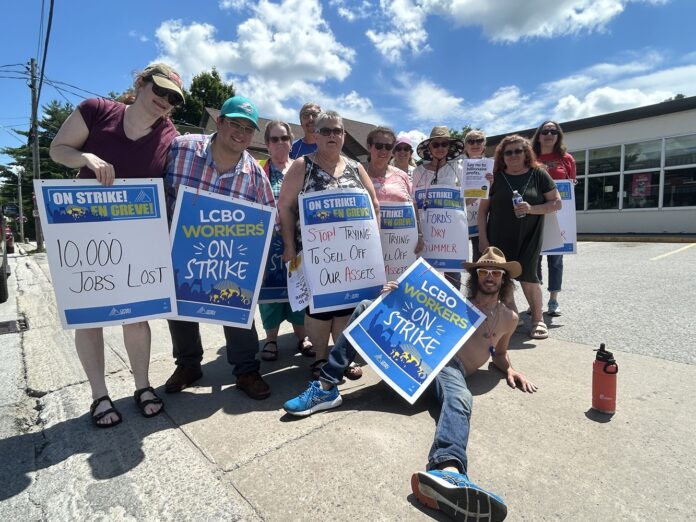Rather than be ticked off they couldn’t pick up their favourite bottle of liquor from the Haliburton LCBO, several would-be customers hammered their car horn and bellowed messages of support for staff walking the picket line along Highland Street July 5.
Last Friday was the first day on strike for Ontario liquor store employees, with more than 9,000 workers walking off the job following a breakdown in negotiations between the LCBO and Ontario Public Service Employees Union (OPSEU).
Guy Alaimo, manager of the Haliburton LCBO, said it’s the first time liquor store employees have been on strike in Ontario. “The issue is a lot more than just wages – yes, money is a part of it, but the biggest issue for me and most of my employees is job security,” Alaimo told The Highlander.
He estimates around 70 per cent of the LCBO workforce are casual employees, who aren’t guaranteed hours and rarely receive benefits. He noted these workers only qualify for benefits after working at least 6,000 hours, which Alaimo estimated would take five or six years.
The latest offer, rejected by employees July 4, leading to the strike action, was for employees to receive a 2.5 per cent wage increase and LCBO to make an additional five per cent of workers full-time.
“Right now, 30 per cent of the workforce is full-time. They’re offering to bump that up to 35 per cent, but we want more than that,” Alaimo said. “The wage increase we’re asking for isn’t huge – we just want them to meet us on inflation, meet us somewhere fair.”
While Alaimo didn’t share how much workers were hoping to get, he pegged inflation and increase in cost of living at around seven per cent.
The Haliburton store typically has between eight and 10 active employees – four of them full-time, including Alaimo. He’s worked there for 10 years and considers himself one of the lucky ones.
“I started as a fixed-term employee, then went casual and became full-time very fast. In most areas in and around the city, you can become full-time working at LCBO after seven or eight years. It’s different here. In these small towns, to get a full-time position with benefits, I know some ladies who took 20 or 25 years to get that,” he said.
The strike is set to run until July 19, but Alaimo said stores will reopen earlier if an agreement is reached. With staff earning $50 per day on the picket line – much less than their usual take home – the local manager hopes the standoff won’t stretch into a second week.
It’s going to take some concession from the Ontario Government, though. One of the major sticking points in negotiations thus far has centred on the proposed expansion of alcohol sales in grocery stores and other outlets. While beer and wine has been readily accessible for several years, there has been talk of making liquor and ready-to-drink cocktails available too.
Alaimo feels that would be a mistake.
“Right now, about $2.5 billion per year goes right back to the Ontarian people as a dividend from the LCBO. If we move further and further into the privatization of alcohol sales, that money will be gone. It’ll go into the pockets of big business,” Alaimo said. “The system we have now is great. There’s no reason for change.”
All 680 LCBO stores in Ontario – including ones across the County – remained closed as of press time, though free home delivery is available. If the strike lasts longer than two weeks, LCBO says it will open 32 stores three days a week, from Friday to Sunday, with limited hours – though it has not disclosed locations.





